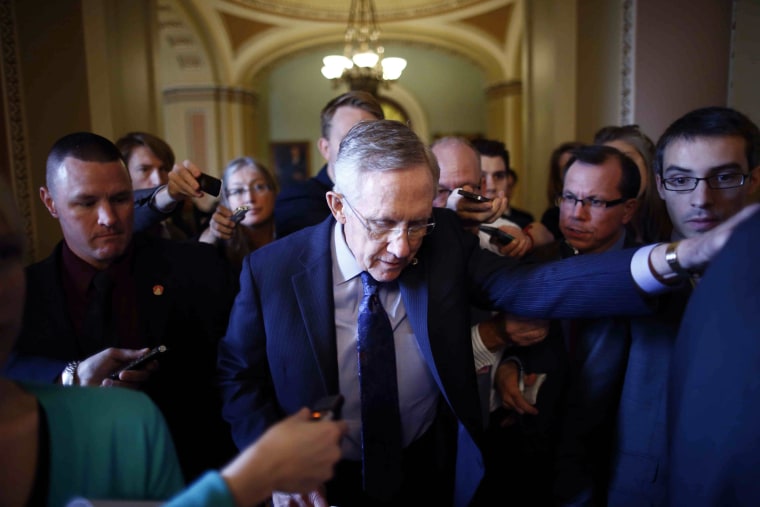The standoff in Washington thawed Friday, but there is little sign that a deal to raise the debt ceiling and reopen the government is imminent.
House Speaker John Boehner hosted a meeting with his conference Saturday morning, which sources told NBC News resembled a “pep rally” — a call for Republicans to stick together in the final days before the country hits the debt ceiling on the 17th.
The House planned to take a series of small votes Saturday , but then head home until Monday.
Sources also told NBC News that the White House had not responded to House GOP proposals for ending the standoff.
In the Senate, Maine Republican Senator Susan Collins is pushing a plan to end the shutdown, extend the debt ceiling for several months, and repeal a tax on medical devices that was passed in 2010 as part of the president’s signature health care bill. That idea is being watched closely as a possible framework for a bargain.
“I’ve fully demonstrated that as much as I would rather have a Republican president and would rather be the majority leader of the Senate, I’m willing to work with the government we have — not the one I wish we had,” Senate Minority Leader Mitch McConnell told the Lexington Herald-Leader Friday. “it’s time to get the government back to work and to begin to solve some of the seemingly intractable problems the country has.”
Senate Majority Leader Harry Reid was seeking to stage a test vote Saturday to see if a clean bill raising the debt ceiling could pass the chamber. Under Reid’s proposal, the debt ceiling would be raised until after the 2014 elections, making it impossible for Republicans to seek to extract policy concessions under threat of forcing the US government into default.
“The President believes that in his meetings yesterday with House Republican leaders, and today with Senate Republicans as well as, of course, with House and Senate Democrats, that there have been constructive talks,” White House Press Secretary Jay Carney told reporters Friday. “When it comes to the House Republicans, in particular, there is an indication, anyway, of a recognition that we need to remove default as a weapon in budget negotiations.”
House Democrats vowed Saturday to bring a bill to the floor that would end the shutdown. But since the GOP controls the House, and Republicans opposed to shutting down the governmenthave yet to split from their caucus in large enough numbers to bypass GOP control of the chamber, there was little chance their effort would succeed.
Nevertheless, the fact that negotiations were occurring at all, was a sign that both the shutdown and the conflict over the debt ceiling might be resolved before the debt limit is reached on October 17. If Republicans do strike a deal, they may have trouble explaining it to their base, which appears to believe that public opinion remains on their side and that the shutdown is playing out to their favor.
“Democrats are feeling the heat!” Texas Senator Ted Cruz, one of the architects of the shutdown, told attendees at the gathering of conservative activists known as the Values Voters Conference on Friday. “The greatest trick the left has ever played is to convince conservatives we cannot win.”
Cruz spent the weeks before the shutdown urging Republicans to close the government rather than fund the Affordable Care Act. But implementation of the president’s health care law went ahead anyway, albeit with some notable glitches.
Almost two weeks since the shutdown began however, repealing Obamacare no longer even seems to be on the table.
